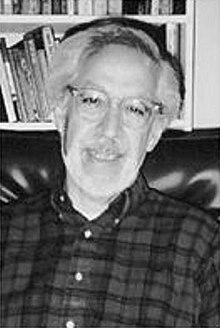Donald Schon
| Donald A. Schön | |
|---|---|
 |
|
| Born |
September 19, 1930 Boston, Massachusetts |
| Died | September 13, 1997 (aged 66) Boston, Massachusetts |
| Education |
Yale University (B.A.) The Sorbonne Harvard University (Ph.D.) |
| Occupation | Learning theorist, philosopher |
| Employer |
Arthur D. Little, Inc. MIT |
| Spouse(s) | Nancy Quint |
| Children | Ellen, Andrew, Elizabeth, Susan |
Donald Alan Schön (September 19, 1930 – September 13, 1997) was a philosopher and professor in urban planning at the Massachusetts Institute of Technology who developed the concept of reflective practice and contributed to the theory of organizational learning.
He was born in Boston and brought up in Massachusetts, at Brookline and Worcester. After doing a Bachelor's at Yale University, he completed Master's and doctoral studies in philosophy at Harvard University. His thesis dealt with Dewey's theory of inquiry. He also studied at the Sorbonne in Paris and pursued advanced study in music (Piano and clarinet).
For many years Schön was with the large consulting firm, Arthur D. Little along with Raymond Hainer with whom he worked on his ideas which resulted in his first seminal work, The Displacement of Concepts. In fact this original work was a new interpretation on the history of the ideas of all time—a complement to Thomas Kuhn's work or even a more accurate look at the dynamics of invention. His later works there presaged a lifetime of interest in the subtle processes whereby technological and other change is absorbed (or not) by social systems. In 1970, he delivered the Reith Lectures for the BBC, on how learning occurs within organizations and societies that are in permanent states of flux. These presentations were published subsequently in his Beyond the Stable State.
Donald Schön became a visiting professor at the Massachusetts Institute of Technology in 1968 and stayed on with an appointment in 1972 as Ford Professor of Urban Studies and Education. He remained there until his death in 1997. During these decades his long collaboration with adult education/organizational behavior expert Chris Argyris yielded key insights into the question of how organizations develop, adapt, learn or fail in these critical missions. Their collaboration led to two books in the 1970s— Theory in Practice and Organizational Learning—the latter of which was completely revised and published in 1996 as Organizational Learning II.
...
Wikipedia
